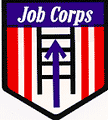|
Job Corps course title: Building and Apartment Maintenance (BAM). Students in this course learn basic job skills involving Facility Maintenance. These skills include basic electrical, basic carpentry, painting, wallboard and facility maintenance and repair.
On the job, workers use a variety of skills to install, repair, and maintain industrial machinery and equipment as well as physical structures like commercial buildings, factories, apartment houses, schools, and hospitals. Their duties may involve repairing restaurant refrigerators, building office partitions, repairing windows and doors, replacing electrical switches, painting walls and floors, laying bricks and installing tiles, clearing clogged drains and replacing plumbing, repairing heating and air conditioning equipment, and rewiring offices.
Back to Top
Maintenance Repairers work inside and outside of all types of buildings from factories, warehouses and office buildings to classrooms, medical facilities, and apartment complexes.
Repairers must work in many building locations, they may work in hot and cold temperatures, in dark places, in tight quarters, on ladders and scaffolding, in awkward positions, and around moving machinery and equipment. They must stand for long periods of time, and their work requires that they be able to bend, stoop, squat, lean, and reach.
Work hazards include factory noise, floors which are dirty and wet from water and greases, electrical shock, hot steam, sharp objects, moving machinery, heavy objects, and much work at heights well above the floor level. Repairers working in manufacturing plants and warehouses must also be aware of dangerous chemicals and industrial gases and liquids. They may be required to wear protective helmets, gloves, reinforced shoes and boots, masks, goggles and other protective devices while on the job.
Maintenance Repairers may work as part of a team or alone, as in most cases with employers with few workers. They usually work a 40-hour workweek but may be required to work in the evening or overnight shifts and on weekends and holidays. Some may be on call for emergencies.
Repairers who work for small employers may have little direct supervision. Those employed by larger establishments will generally be supervised by an experienced crafts worker such as a carpenter, plumber or electrician.
Those who work in manufacturing plants or in industries like hotels and resorts may be laid off from time-to-time because of seasonal changes and production scheduling.
Highly skilled Repairers may develop into specialists who perform the more difficult diagnoses and repairs in the shop. Those with supervisory abilities can promote to shop supervisor or service manager. Others may become specialists in one of the construction and mechanical crafts.
In Santa Clara County this field is expected to grow by more than 20%, although that is slower than the countyâs overall job market growth. Statewide growth is expected to continue but is somewhat subject to economic cycles.
|
Santa Clara County
Entry Level/No Experience
|
Union
$12.00 |
Median $12.00 |
| Non-Union $6.25-$8.00 |
Median $7.00 |
To enroll in this San Jose Job Corps Course: 493 TABE Math/Reading score OR GED/HS diploma.
Job specific skills: Repairers have skills in several construction and mechanical crafts such as carpentry, electrical installation and repair, plumbing, painting, roofing, and mechanics.
Maintenance Repairers use tools ranging from common hand and power tools such as hammers, hoists, saws, drills, and wrenches to precision measuring instruments and electrical and electronic testing devices.
They may be required to read and understand diagrams, drawings, blueprints, maintenance manuals and schematic diagrams. Some may be responsible for ordering parts, supplies and equipment from industrial catalogs and suppliers.
Mechanical aptitude, the ability to use basic math, and manual dexterity are essential. Problem solving ability is required for more complicated jobs. A familiarity with computers will be valuable for Repairers who work in buildings with computer control systems and in factories and warehouses using computerized production and distribution equipment.
The occupation requires workers to have normal or corrected vision, good hearing, full use of both arms, hands and legs. They should be able to stand for long periods of time, move and lift heavy objects, work in awkward positions and in tight quarters, and be in good overall physical condition.
Back to Top |



